San Francisco Chronicle
On the Town with Chuck Prophet
Chuck Prophet, a former member of famed cosmic rock duo Green on Red, has just released his eighth solo album, “Soap and Water” (Yep Roc). The critically acclaimed singer-songwriter recently made his acting debut in the independent film “Revolution Summer” and signed a deal with Chronicle Books, which next summer will release “Shoulda Stayed in School - Road Diaries From the Rock ‘n’ Roll Trenches.” We asked the longtime Duboce Triangle resident for a tour of his favorite neighborhood haunts. (Prophet plays the Make-Out Room tonight).
Golden Produce, 172 Church St. “It’s a family-run produce market right across from Safeway on Market. If you like pears, they carry about eight different kinds. I love the folks that run it - three generations from Cambodia. Golden Produce has got soul.”
Jack’s Laundry, 196 Noe St. “I just adore the woman who runs this laundry. She always laughs when I ask, ‘Which one of you is Jack?’ Aside from the usual dry cleaning, wash and fold stuff, she’s a great seamstress - mends, hems and puts love and care into everything she does. In fact, she hand-sewed each patch on the Green on Red trucker hats. Bonus points for overnight work, too.”
Rosamunde Sausages, 545 Haight St. “Tuesday is burger day. It gets slammed in there and they can get irritable behind the counter if you don’t order properly. So get there early or you’ll be handed a sausage. Wait in the Toronado Bar next door, get a real draft root beer and drop some quarters in the jukebox that’s stocked with ‘deep cuts’ for days.”
Cliff’s Variety, 479 Castro St. “I almost forgot what I came there for: I found myself staring at a unicorn pencil sharpener when a friendly clerk asked if there was anything he could help me with. I was directed to the fabric annex next door and left with a couple yards of Velcro for my pedal board and a spare key for the touring van.”
Peacock Music, 2200 15th St. “Maybe you just want to replace one string on that banjo that never gets played or pick up a bow for your kid’s violin. OK, so you’ll never be Pete Seeger. If all else fails, go on and tune all four strings on that banjo up to one note and play it with a bow. The owner, George, told me recently his church choir could use a baritone singer. I was deeply flattered. Might take him up on that someday.”
Amoeba Music, 1855 Haight St. “In Holland, where I’m touring right now, they’ve turned churches into venues. In San Francisco, they’ve turned one of the last bowling alleys into the Amoeba record store. It’s only the largest new-and-used record store in the nation.”
Philz Coffee, 3101 24th St. “Located in a funky storefront at the corner of 24th and Folsom, each cup of Philz Coffee is ground and made by hand. Phil himself is a real character: an expansive personality, compact, fedora-sporting, mustachioed bundle of energy. You can’t get a latte or a mochachino, but you can get one of the many painstakingly blended combos that Phil has perfected in his 30-plus years in the business. Don’t be surprised if he pulls out a long spoon, turns to one of the gals there, spoon feeds her some foam off the top and says, completely seriously, ‘Don’t swallow it down, swirl it around, make love to it.’ The mint leaf garnish is a nice touch.”
Schauplatz Clothing & Furniture, 791 Valencia St. “I’m a lanky guy. I have what you might call an elongated torso. It’s hard to find jackets that fit. Some days, the thrift store gods are smiling more than others: I found a nice sport coat in there recently, and the fellow behind the counter in his German accent said, ‘Oh yes, very good choice, this just came in, 42 long don’t stay long.’ Their stuff is always clean and wrinkle free. Note to other vintage clothiers: Go ahead and splurge for some dry cleaning. Tack it on to the price if you have to. Thrift stores can be hit and miss. Takes someone with an acute eye to run it. It’s a gift. Some people have the gift. These guys always dig up good stuff.”
P.O. Plus, 584 Castro St. “This is the mailing joint in my hood. It’s a FedEx, DHL, UPS and USPS hub all in one. Ahmad is the man there, a good guy. I like it when I’m done with my packages or whatever, he’ll ring his bell on the counter and shout, ‘Next customer!’ even when there’s no one there.”
El Tonayense taco truck, 22nd and Harrison streets. “Tommy Guerrero turned me on to these guys. I hired them to cater our gig at the Make-Out Room. Yes, you heard right. Free tacos for all my friends! I’m a carne asada man myself, but they do a killer al pastor, which is sort of like a Mexican doner kebab. It’s slow-cooked pork, thinly sliced off the spit with a large knife.”
by
Aidin Vaziri
on
October 20, 2007
Manchester Evening News
Why all this Prophet of doom, Chuck?
IT has been three years since his last album, Age Of Miracles, but Chuck Prophet hasn’t exactly been sitting around.
For one thing, there’s his own new album, possibly his best, called Soap And Water.
He has also produced a new album from Kelly Willis (“We jumped off some cliffs together!”), reformed and toured Europe with his former band Green On Red, collaborated with Alejandro Escovedo an a new album, made his big screen acting debut in a film called Revolution Summer, and worked on the soundtrack of the Sundance Film Festival hit, Teeth.
Surprisingly, then, Chuck talks of a “crisis of faith” after Age Of Miracles.
“We toured for a month too long with that record,” he contends. His current touring band, though, which he’ll be bringing to Club Academy this weekend, is, he enthuses, “lighter on their feet than any band I’ve worked with before”.
Speaking of which, a lot of people were surprised when alt-country rockers Green On Red reformed a few months back “It took us by surprise too,” he laughs.
“I suppose we did it as a kind of dare, but I was surprised, I think we all were, at the ease with which it came together. Might we do it again? I wouldn’t be against it at all.”
The project with Alejandro Escovedo also “just sort of happened. He asked me down one weekend to try writing some songs together and we’ve ended up writing a whole record.
“It’s sort of like our joint musical biography. There’s a lot of real characters in there.”
by
Kevin Bourke
on
September 26, 2007
Marquee Magazine
Chuck Prophet finds solace in this Age of Miracles
Chuck Prophet is a perverse kind of guy. He’s the type of person who would invite all kinds of people to the same party - in part because he likes them all, but also so that he can see what happens when they all hang out together.
The singer/songwriter, who spent eight years with the psychedelic cosmic cowboys Green on Red - a band that was described as a country-meets-folk-meets too many drugs Americana -is set to release his seventh solo CD and second album for New West Records, Age of Miracles.
True to Prophet’s form the album is a mish-mash of styles, collaborators and conspirators, which for some reason fit together like the pieces of a Tetris puzzle.
“When I catch an inspirational virus, I try to inflict it on my closest conspirators and even come up with a batch of songs. Then assemble a group of talented, intense, fierce, difficult, even perverted people, many of whom I’ve worked with before and a few I’ll probably never work with again, lock ’em in a studio and ... you get the idea,” Prophet said.
While it sounds like a strong formula for success Prophet admitted that producing Age of Miracles actually threw him for a loop several times. “I had a couple of false starts where I had to discard some material because there was some kind of overlap schematically. In some ways I kind of simplified things a lot to embrace the chaos and resist the temptation to fix it. It was just one of those records with false starts. I went this direction, and then went another one, and about three-quarters of the way through I guess I got in a groove,” he said in a recent interview with The Marquee.
Through it all, Prophet has kept two things in the forefront of his mind - one, avoiding singer/songwriter trappings and two, that no matter how hard you try, there’s only so much you can do on one record.
“In Green on Red, we did a lot of fun, character-driven songs, and I think that helps me to avoid a lot of the singer/songwriter trappings, You know, ‘My coffee’s getting cold’ kind of things that I try not to fall into,” he said about the former.
As for the latter, he commented, “My self criticism (once my closest and most reliable friend) gave way to a struggle with my self esteem and mental health. So I took a little break from the record to get some ... ah ... perspective. I found there were some food groups under-represented on the record. So I looked around the couch and pulled out the dusty shoe box of cassettes. At about the same time, I bumped into Eric Feldman (P.J. Harvey, Polyphonic Spree and Captain Beefheart) and I immediately enlisted him to oversee and co-produce. Because even with all the new technology, it’s still impossible to be on both sides of the glass at the same time - Jim Dickinson taught me that.”
by
Brian F Johnson
on
August 3, 2006
The Exponent
Power of music keeps performer off streets
Chuck Prophet knows he sounds corny when talks about what music has done for him. But he says it anyway.
“(Music) kind of saved me,” he said. “So much of who I am is wrapped up in it.”
Prophet left Tucson, Ariz., Tuesday morning after a reunion show with his old band, Green on Red, who made records for eight years in the 80s. But while there, catching up with people who used to be part of the music scene, he saw what had happened to them over the past two decades.
So many of his friends looked zombified. Prophet used the phrase “dope fiend” to describe some.
“There’s a whole lost generation,” he said.
In 1990, he started off his solo singer/songwriter career playing Dylan-esque rock ?n’ roll blended with blues and country. Investing himself in his music kept him off the streets.
“It kept me interested in what I was doing enough to have something to focus my energy on,” said Prophet. “It helped me when I cleaned up.”
Now his music brings him to the Lafayette Brew Company, where he’s performing at 7:30 p.m. on Sunday.
Prophet said the crowd can expect some “juvenile rock ?n’ roll, some real tear-jerkers ... some ugly lies and some beautiful truths all wrapped up in a five piece band.”
He added, “There’s an overall sense of irony to what I do ... as well as some dead on, unflinching, straight up, blood-stained, diary kind of songs.”
The show is presented by Friends of Bob. Singer/songwriter Sally Timms is also performing.
Richard Fudge, president of the group, said that Prophet is a show that he’s personally excited to bring to Lafayette.
“If I were to list my top five favorite performers, Chuck Prophet would be in there,” said Fudge. “It’s exciting to bring somebody to town that you feel pretty sure people are going to be dazzled by.”
Prophet said he looks forward to live shows because they are never static. And while he says there’s more important things in the world than music, music makes him who he is, it connects him to people through his shows or albums, and Prophet recognizes this. His work in music has given him so much over his almost quarter decade career.
“I always found that whatever I put into music, I always got that much more back.”
by
Craig Davison
on
September 8, 2005
Riverfront Times
As an unlikely guitar hero, a subgenre co-inventor and a rock & roll cultist’s Kool-Aid king, Chuck Prophet was the unacknowledged legislator behind LA’s pseudo-Paisley Undergrounders Green On Red, who were the most terrifyingly talented band of the great roots-rock scare of the ‘80s. Now solo, Prophet splits the difference between post-modern blues pastiche and chicken-fried country soul, putting the “bomp” in the “bomb-shooby-dooby-bomp” with all of the greasy wah-wah pedals abandoned since Curtis Mayfield left the charts. His records sound like the ones Mayfield should have made with Bob Dylan; his rare Midwest dates sound like a must.
by
Roy Kasten
on
September 6, 2005
Somewhere off Hwy 61
One of my favorite loopy local SF characters, not to mention fine and friendly songsmith of no small renown, has been Chuck Prophet. I’ve known him on and off for years, from bullshitting in under the influence in the dark backrooms of bars & under the flourescence at the local copy shops, to riding rollercoasters both real and imagined… Uh, I guess you could say, what a long strange trip it’s been…
Read the whole article here:
by
lil Mike
on
July 30, 2005
East Bay Express
For Prophet
The unheralded Chuck, that is
With the recent fad for books dishing the French superiority complex, let’s remember that no long list of transgressions is needed to prove our own cultural stupidity. Not when Chuck Prophet is a cult hero in Europe but just a rumor of a critics’ fave in the United States. The San Francisco-based singer and guitarist doesn’t seem too bent about the whole thing. “I’m just now getting the hang of it,” he says of his relative notoriety overseas, “though sometimes it does seem like a long way to travel just to eat some smelly cheese.”
What we’ve missed is not the mere aesthetic experience we’d expect Euros to appreciate, but rather a ton of heart and melody. Prophet’s work since his 1990 solo debut is grounded in his singular approach to singer-songwriter classicism. Take the title track of 2002’s No Other Love, a pit-in-your-stomach gorgeous silhouette of a ballad composed of little more than strings and Prophet’s thick croon; or last year’s roomy Age of Miracles, his seventh album, stuffed with literate pop-rock that manages to make use of a sampler as tunefully as it does guitar. This is music to rehabilitate the word “eclectic” from its abuse by interior decorators.
Prophet first eluded us back in ye olde 1980s, when his adolescent band Green on Red helped found LA’s Paisley Underground scene. “I don’t think about it much, but when I do, I have to quickly take my medication,” he says of the band’s decade-long run. “Some people considered Green on Red a group of juvenile buffoons—others considered us one of the greatest rock ‘n’ roll bands in the world.” Then there was “alt.country”: in the late ‘90s, while we were we were pumping overrated Wilco, Prophet was busy putting out record after rootsy, rangy record. “How can I dis a scene that has heated debates over the best version of a Townes Van Zandt song?” the ever-philosophical tunesmith says. But Prophet doesn’t deserve to have to be so good-humored in the face of indifference, and the Euros shouldn’t get to gloat.
Prophet plays Friday night at the Starry Plough. Be there or be a dumb Yank.
by
Stefanie Kalem, Andrew Marcus and Kelly Vance
on
June 21, 2005
Cool Hand Bak
Someone really should have told me about Chuck Prophet. I mean, anybody making music this fucking outstanding doesn’t deserve to fly under anybody’s radar, least of all mine. His music is practically perfect for my particular tastes: well-crafted songs composed by a songwriter (in the truest sense of the word), sung by a country singer (at heart) but produced with an ear to what’s going on in the rest of the musical world as well. Over the course of his 2004 near-masterpiece, Age Of Miracles, Prophet comes off as a less willfully eclectic (and therefore more enjoyable) Beck, living with one foot a little bit deeper in country music than Mr. Hansen would probably consider cool. Actually, he’s kind of like the guy I posted on yesterday in the way he takes the arms and legs of different styles and comes up with his own hideously beautiful beast. I think his press sheet sums it up best: “...a world where Dr. Dre and Charlie Feathers would both feel comfortable.” That’s brilliant man, that’s exactly right.
I picked up Age Of Miracles as an impulse buy (read: I liked the cover art) about a week or so ago and I have not been able to stop listening or wishing I was listening to it since. I guess I had heard Prophet’s name before, but I’m taking the pat on the back for introducing myself to his music. Good job bak, you really outdid yourself this time! Now turn to the people at home and let them hear what all the fuss is about. Listen people, you need to hear these songs:
Chuck Prophet - “Age Of Miracles”
Chuck Prophet - “Pin A Rose On Me”
Chuck Prophet - “West Memphis Moon”
Age Of Miracles is good enough to be a greatest hits album, except for the little fact that none of the songs can honestly be called hits and it’s more cohesive than most compilations. Actually, it’s better than most people’s greatest hits albums. “Age Of Miracles” and “Pin A Rose On Me” are two of the best songs on the album, but I would’ve liked to post “You Did (Bomp Shooby Dooby Bomp)” rather than “West Memphis Moon”. “You Did” is a hell of a lot more fun and it features his best incorporation of samples and hip-hop elements, plus it’s one of the songs on repeat in my head these days. Whatever, it doesn’t matter, every song on the album is good and these are the songs that New West Records has kindly made available. Damn you New West, you really think I needed one more person’s entire back catalogue to hunt down!?! Now how am I gonna eat this month?
Pay a visit to Chuck’s website for more information and stuff, like tour dates. Man, I bet these songs are a blast live, but I don’t think I can justify driving back to Denver for another show.
by
Bakinakwa
on
April 18, 2005
The Guardian UK
Borderline, London
It’s been 20 years since Chuck Prophet found himself lumped in with LA’s neo-psychedelic "Paisley Underground" during his tenure with Green on Red. But since launching a solo career in 1990, Prophet has kept evolving as a songwriter and guitarist of formidable (albeit under-appreciated) gifts.
The Borderline’s promoter, Barry Everitt, will sing Prophet’s praises to anyone within earshot, including tonight’s audience. Springing to the microphone before Prophet’s band came back for some encores, Barry commended him as "one of the best fucking guitarists in existence".
This is true, and one of several good reasons for going to a Prophet show is the opportunity it affords to watch a master of the Telecaster in full spate. Prophet’s playing is like an instant guide to 50 years of guitar-playing, from the twangy bottom-end tones of Dick Dale or Duane Eddy to rolling barrages of Neil Young-style chords or intricate, string-bending runs in the Clarence White mould. The trick has been to shape his playing into an indispensable part of the way he writes and performs, so the guitar is woven through the music like an inner voice supplying insights, asides and a running commentary.
Prophet’s songwriting is similarly eclectic, though he adds an idiosyncratic spin so that the stuff coming out of the blender couldn’t be anybody else but him. Chuck has a radio-friendly side to him, best expressed in the effervescent Summertime Thing, but he also likes to range through sprawling narratives that travel from urban chaos to desert wilderness.
Prophet’s dirty-blonde hair and dark southern drawl render him susceptible to country-boy stereotyping, and the likes of Just to See You Smile can only be described as country rock. On the other hand, You Did rollicks along over a modified hip-hop beat while Prophet growls into a weird metallic-sounding microphone, and wonders "who put the wang in the wang-dang-doodle? You did!!!" He’ll also defend to the death his right to borrow from Bob Dylan, who popped up in a cover version of Abandoned Love. Prophet called his new album Age of Miracles, and he had a point.
· At King Tut’s, Glasgow, tonight. Then touring.
by
Adam Sweeting
on
April 15, 2005
Pittsburgh: Tribune-Review
The cover of Chuck Prophet’s latest album, “Age of Miracles” is a William Eggleston photo of a young woman holding a vintage camera sprawled across a patch of grass. The box camera image is repeated in the accompanying CD booklet.
Some sort of artistic statement?
Not really.
“To be perfectly honest, I didn’t have an album title,” says Prophet, noting his affinity for Eggleston’s work. “When I finished the record, when I stood back and squinted a little bit and knew I would have to invent some lies for the bio, I realized there was a kind of a theme running through it, this retro-nuevo general crankiness with technology, and technology not really improving our quality.”
Prophet, who visits the South Side’s Club Cafe on Friday, says he was a bit nervous about applying this theme because it’s been overdone.
He shouldn’t have worried. “Age of Miracles” continues the San Francisco-based musician’s run of superlative releases that dates to 1999’s “The Hurting Business” and includes “No Other Love,” released in 2002. Along with “Age of Miracles,” the discs share a sense of adventure as Prophet seamlessly combines rock, soul, blues, hip-hop and other forms.
Critics and writers often remark on his ability to “mash” or “synthesize” genres; Prophet says he’s sometimes bothered that form seems to be more interesting than content.
“But I can’t help but wonder, in a perverted way, what Meredith Brooks and Burgess Meredith might do if you put them together,” he says with a laugh. “Or what Jimi Hendrix would do if you brought him back from the dead and said ‘Hey Jimi, you might want to check this out, it’s called a Casiotone. This part here you can get a beat going and with your fingers here you can play chords on these buttons and over here you can play melody.’ You just make something up and want to record it. Because inevitably, it would be more interesting than the conventional way that people make records. I guess that’s my own perverted way of keeping myself interested. I don’t think you need an owner’s manual to get through the record.”
He’s right; all that’s truly required is an appreciation of music. Whether it’s the melancholic “Pin a Rose on Me,” the playful electronic pop of “You Did (Bomp Shooby Dooby Bomp)”—a song that asks “who put the ram in the ram a lama ding dong?”—or the wistful title track, Prophet has a knack for creating memorable melodies.
He especially excels at painting the lyrical details: the “extra-special shoes” for “The Smallest Man in the World,” or the itinerary of “Just to See You Smile” in which the narrator walks “20 blocks to your favorite bakery” in order to surprise his lover with her “favorite treat.”
“I have my own value system, the things that I think that are worth wrestling into the form of a song,” he says. “And it changes, because you have to keep yourself interested in what you’re doing, musically and thematically. And to keep yourself interested, sometimes you’ll discard things if they have a certain familiarity. If I had any more songs about lonely motel room’s on life’s highway, it’s not interesting to wrestle with anymore. I’ll just discard it.”
Prophet admits to being disenchanted with his music when he’s finished recording an album. It’s only when he gets a chance to hear it in an unfamiliar environment—a record store or somebody else’s home—that he reconciles with his art.
“It’s a lot like honking your horn in a tunnel and waiting for it to get you off,” he says. “Sometimes, it just doesn’t get you off. Sometimes, it’s just not so cool anymore. You just wait to hear it bounce off the walls and come back at you.”
by
Regis Behe
on
January 26, 2005
The Austin American Statesman
Chuck Prophet couldn't predict radio would play him
Chuck Prophet doesn’t need a map to get around in Austin. He’s so familiar with the city, it almost sounds as if he lives here. The San Franciscan has done his share of South By Southwests, and a reference to South Congress Avenue slides easily off his lips. But the bigger deal is his affiliation with Austin- and Los Angeles-based New West Records, which just released “Age of Miracles,” his second album under that label. New West propelled Prophet’s irresistible “Summertime Thing,” from his pinnacle album, 2002’s “No Other Love,” into an adult album alternative radio hit. (KGSR 107.1 is the local representative of that format). After seven years of playing guitar in the hard country-rock band Green on Red, and another 12 years trying to crack North America as a solo artist in the soul/pop-rock/funk/dirty blues/mild hip-hop/etc. vein, Prophet had no expectations of even getting airplay. Chuck Prophet, who stretches over many eras and genres, has a new album out and a gig Oct. 9 at the Continental Club. “We had a brief meeting about how to market it and promote it. I suggested we all stand in a circle and hold hands and pray,” he laughs. He was stunned when the New West gang told him they were serious. “Getting on the radio was the kind of advice my Dad gives,” Prophet says. Imitating his father, Prophet intones, ” ‘Son, what you need to do is get on the radio.’ It’s like, ‘Thanks, Dad. Maybe we can get together and have a panel at South By Southwest. Or better yet, you go and tell me what you learned.’ ” Ah, there’s that Prophet wit. He shares doses of it throughout the interview, as well as in his songs. His explanation of what happened after “Summertime Thing” took off goes, “Instead of seeing five guys with beards, we started playing to, like 25 girls in tube tops. And nobody was complaining. Not even Stephanie, my wife.” Stephanie Finch is the band member behind the Farfisa organ, from which she evokes the unmistakable sound that filled so many ‘60s hits. Prophet, a seriously wicked guitar player who loves his wah-wah pedal and other effects, often revisits that era for inspiration. Prophet lists Bob Dylan, Randy Newman and Leonard Cohen as his major influences; Brill Building scribes such as Carole King and Jerry Goffin clearly had an impact as well. On “Age of Miracles,” he’s got a song called “You Did (Bomp Shooby Dooby Bomp),” complete with “shoop-shoops” and triangle dings. For this album, Prophet had an even more direct link to that era; he co-wrote a song with the legendary songwriter and producer Dan Penn, author of the Box Tops’ “Cry Like a Baby,” and several Aretha Franklin hits, including “Sweet Inspiration,” “Do Right Woman” and “Dark End of the Street.” Years ago, Prophet’s acting manager sent him to Nashville to try songwriting (an “incredibly original idea,” he notes dryly). The first time he went, he had a gig at the famed Bluebird Café. “It turns out I was booked the night of the CMA (Country Music Association) awards, which is like the Super Bowl of country music,” Prophet explains. “I was just about ready to take the stage and perform for the doorman and the soundman when Dan Penn showed up. I guess he was the only guy who didn’t know it was the CMA awards.” They wound up writing the new album’s “Heavy Duty.” Kim Richey is another collaborator; she co-wrote “You’ve Got Me Where You Want Me” and “Pin a Rose on Me.” “I think it’s still a pretty special thing when two people can get together and do that. It doesn’t work with everybody,” Prophet says. “(But with) somebody like Kim Richey, it’s just like fallin’ off a log. She has a natural gift for just drawing a straight line.” When Prophet finds he needs a second opinion, he’s not shy about asking for help. “Sometimes,” he says, “I have to do what Dan Penn describes as bringing in a couple of people to perform a miracle. It increases your odds.” Prophet does all right by himself, too. “Summertime Thing’s” brilliance has as much to do with its vivid lyrical images as it does an incredible melody. For instance: Go ask your dad for the keys to the Honda Can your sister come along, how could she not wanna Put the Beach Boys on, wanna hear “Help Me Rhonda” Put the Beach Boys on, wanna hear “Help Me Rhonda” It’s a summertime thing ... Though she’s not credited as a co-writer on any songs, Finch has to be a major collaborator as well. They’ve been on the road together for so long, he can’t remember whether it’s been 10 years, or 13 or 14. “Sometimes, it’s less of a marriage and more like we’re Army buddies,” he says. “We get along better the more difficult it is, really. The road kind of brings that out in people.” As his New West/“Summertime Thing” experience proves, it might take a lot of miles, but eventually you can find the place where you belong.
by
Lynne Margolis
on
October 6, 2004
Lexington Herald Leader
Chuck Prophet turns music into movies
Lynagh’s was launch pad for cinematic-style singer
There’s a song on Chuck Prophet’s new album, Age of Miracles, called West Memphis Moon that tells you all you need to know about how effortlessly the San Francisco songsmith blends story and style.
The lyrics outline a murder mystery, the tale of a self-described “walking razor blade” detailed in misty shades of black and white. But the accompanying sounds couldn’t be more colorful: hand claps, vintage keyboard orchestration and washes of wah-wah guitar. Suddenly the song’s sense of fleeting menace is big enough to fill a movie screen.
“Actually, I cast a song like a movie,” Prophet said by phone last week. “Every one is different. I work out an arrangement more than most rock guys. But I also like to think I keep my ears open for any kind of strange collisions or accidents that might happen. I like to be well-prepared but remain willing to adapt and improvise. A song, to me, is a way of getting behind an idea and pushing it forward.”
Lexington has been lucky enough to watch Prophet’s musical movies unfold with a series of performances that began at the now-defunct Lynagh’s after the release of 2000’s The Hurting Business. He returns to town Thursday.
Prophet’s early solo records took directions he never considered. Literally. They were released mostly through overseas labels, which meant he performed more in Europe. The Hurting Business increased his stateside notoriety as well as domestic distribution for his music. Lexington soon became one the first touring destinations to champion Prophet’s earthy mix of twang, pop and cinematic-style rock ‘n’ roll.
“Around the time of The Hurting Business, I got a manager,” Prophet said. “We decided it would be a good idea to get a booking agent and a van. That’s when places like Lynagh’s became early anchors for us.”
Popularity for Prophet’s music has mounted since then. The breezy pop single Summertime Thing became a surprise radio hit in 2002. Tours with Lucinda Williams and, more recently, the Old 97s followed. And in June, a version of the title track to his album No Other Love was released by, of all bands, Heart.
“Sometimes I still have a low-level anxiety about where the next song is coming from,” he said. “But I feel more committed to what we’re doing now more than ever. I feel I’m just getting started.”
by
Walter Tunis
on
September 26, 2004
The Courier-Journal, Louisville
A Prophet walks among us
Rocker to lead last Waterfront Wednesday show
Chuck Prophet loves him some Heart. Those Wilson sisters, Ann and Nancy, absolutely rock. Heart’s new album features a cover of Prophet’s “No Other Love,” which means a significant payday for an artist who doesn’t see a lot of those. It helps that Heart does justice to Prophet’s beautifully sad ballad.
Chuck Prophet began a solo career during Green On Red’s final days and has probably performed or recorded with nearly every one of your favorite bands. “It wasn’t sad when they recorded it,” he said, laughing. “That was a good day for me, dawg.”
Prophet is a funny guy. Conversation with him can veer crazily from films to books to music to absurdities, not necessarily in any order.
Ask him about writer’s block and suddenly he’s talking about crime novelist Jim Thompson. Mention digital recording technology and in seconds he’s going on about filmmaker Lars von Trier. He sports an active, curious mind, which may be essential to surviving a 20-year career in a business noted for ignoring its best talent. When things get tough, there’s always comfort to be found in a Sterling Hayden marathon.
Prophet and partner Dan Stuart helped define Americana music with Green On Red throughout the 1980s and early ‘90s. He began a solo career during Green On Red’s final days and has probably performed or recorded with nearly every one of your favorite bands.
Saying that Prophet is only now peaking as a writer isn’t a hard sell. His last four solo albums - “Homemade Blood” (1997), “The Hurting Business” (1999), “No Other Love” (2002) and the new “Age of Miracles” - are studded with powerful songs.
It’s no coincidence that on the last three he has expanded his possibilities by exploiting digital technology in the arenas of recording, editing and performing. Once an example of straight-up traditionalism, Prophet has embraced tape loops, beat boxes and creative editing, but, unlike so many others, he uses it all to serve the song. Rarely have electronics sounded so organic.
“When Pro Tools technology came along, all the roots-rock Nazis were still arguing about vinyl sounding better than CDs, which is an easy way to get me to leave the room,” he said.
“You can definitely use Pro Tools to get rid of all your mistakes. You can make something that’s perfect. But the cool part is taking the mistakes and making them repeat so you get these really abstract hooks.”
Live, Prophet remains a tough, visceral rocker - even a guitar hero. He will headline the season’s final WFPK Waterfront Wednesday concert, on Harbor Lawn.
by
Jeffrey Lee Puckett
on
September 23, 2004
Now Weekly - Toronto
GROUNDED CHUCK
FORMER GREEN ON RED SONGSTER STAGES STUDIO VERSION OF THE SURREAL LIFE
When Chuck Prophet inadvertently scored a left-field Americana radio hit with his catchy tune Summertime Thing from 2002’s No Other Love (New West), there was some concern that the former Green on Red guitarist might have found his true pop calling and decided to cash in his cult credentials for good.
But listening to Prophet’s just-released Age Of Miracles (New West), on which he tries to rap his way through a cockeyed answer song to Who Put The Bomp? – appropriately called You Did (Bomp Shooby Dooby Bomp) – it’s apparent that some people are just destined to be outsiders.
Anyone can have a fluke hit, but it takes a real fringe artist to squander that rare moment in the spotlight. Soon the cash windfall will be blown and he or she will be back to weirdness as usual. For Prophet, that means assembling a seemingly unconnected cast of creative collaborators – anyone from Kim “Bette Davis Eyes” Carnes to Consolidated’s Mark Pistel – and just letting the music happen. It’s kind of like the Surreal Life approach to record-making.
“I read this interview with filmmaker David Mamet where he was saying how he likes to get together a cast of actors he’s worked with before – even though they may not have worked with each other. That way, he doesn’t need to pass around an owner’s manual. They all know what’s expected. Then he’ll throw in a few blind dates. It seemed like a good idea.
“That’s how I cast my recording sessions now. I’ll call on some old friends so I know we’ll understand each other, and then I’ll bring in a couple of wild cards to fuck with shit and, you know, liven up the party a little bit.”
Having certified eccentric Captain Beefheart alum Eric Drew Feldman come in and give things a tweak certainly didn’t hurt.
It’s interesting to note that over the course of his seven albums since going solo in 90, the frequency of Prophet’s collaborations – particularly on songwriting – seems to have increased since he gave up alcohol. Prophet claims it’s not at all a coincidence.
“Since I quit drinking and cleaned up my act, co-writing has replaced the social life I gave up. Some people are really private about writing songs and try to preserve the mystery and magic of it all, but there are others, like, say, Dan Penn, who believe it’s easier for two people to perform the miracle. I can appreciate both ways of working, and there are advantages to each.”
Prophet’s partnership with Southern soul poet Penn – the man behind Dark End Of the Street, You Left The Water Running, Do Right Woman, Out Of Left Field and countless other timeless classics – led to the understatedly elegant A Heavy Duty, a highlight on Prophet’s new disc.
“When I started going to Nashville to try my hand at Music Row songwriting, I got a gig at the Bluebird Cafe that I didn’t realize was on the same night as the CMAs. Only three people showed up – the bartender, the sound man and Dan Penn. We’ve been writing together ever since.
“Somebody might call up Dan saying, ‘We need you to write a song for Solomon Burke.’ And then we’ll start by just talking. He’ll say, ‘You know, Chuck, when Solomon gives you his word, he’ll stick by it, he’s a man of in-teg-ri-tay! The song we wrote for Solomon, I Need A Holiday, was recorded for Don’t Give Up On Me, but unfortunately, it didn’t make the cut.”
They had better luck placing Penn’s vocal take on A Heavy Duty on the second volume of the Country Got Soul (Casual) blue-eyed soul compilation.
“Someone from the Casual label called up Dan asking for a song, and he sent them a bunch. They wound up choosing A Heavy Duty, which is really just Dan playing guitar and singing and me doing everything else.
“We’ve got a load of songs recorded the same way. There’s probably enough for an album if someone wanted to put it out. Hey, I’d buy it.”
That makes two of us.
by
TIM PERLICH
on
September 8, 2004
Harp
Chuck Prophet performs musical miracles
Chuck Prophet covers a a wide range of musical ground on his latest outing. In then opening tracks alone, we got from loud and dirty rock (“Automatic Blues”) to cross-generational Lennonesque (think: Mind Games) psyche pop (Age Of Miracles”) to the hip-hop infected, hyper melodic nod to the history of pop culture idioms (‘You Did”) – which if it doesn’t answer, at least raises many more musical questions, including: Who put the ram in the ram a lama ding dong…? Who raised the roof and never made a sound? Who cleared the static and made it sing? You did” Prophet seems to have a fondness for throwing many different people and various sounds together just to see what happens. Dig the transformations throughout a cut like “Pin A Rose On Me”. The Magic of such experimentation is no mistake; Prophet knows what he is doing. The results are enchanting, particularly the Spector of Wilson that drives a tune like “Just to See You Smile” or the lilting groove of “You Got Me Where You Want me”. I never did believe in miracles, and I’m beginning to wonder why.
by
EDWARD BURCH
on
September 1, 2004
The Rage
New Traditionalist
Chuck Prophet may be best described as a new traditionalist - or a traditionalist for the 21st century. He works happily within the constructs of American roots music’s structures and sounds, but sets them on their ears with clanking, roiling rhythm sections and lyrics that sketch images in bold outline but leave the details blurry. With his considerable guitar skills, murky grooves and growling delivery, Prophet can twist a conventional song into a gritty, hungover animal that will let you pet it, but may bite your hand off if you ain’t careful. The artist who cut his teeth as guitarist for Green on Red in the ‘80s has grown, over the past decade, into a formidable writer with a distinct vision. As he tells The Rage, ‘The challenge is that you want songs to make sense, you just don’t want ‘em to make too much sense. So, there’s a slightly abstract expressionist approach to it.’
And expressionist he is on his sixth and most recent solo release, No Other Love. With 11 snarling, swooning songs and a no-b.s. delivery, Prophet is at his finest. The sonic corners of the record are filled (but not overstuffed) with wonderfully skewed details - tape recorders, omnichords and accordions peer out from the shadows. ‘For me,’ Prophet explains, ‘records are defined by things like the theremin at the beginning of Good Vibrations or the fuzz guitar on Satisfaction or the fact that somebody was smart enough to tell Roger Daltrey to stutter when he sang My Generation. Those are the little things.’ Laughing, he adds, ‘Sometimes they just appear, other times you gotta go around with a flashlight in the dark looking for them.’
With his gruff delivery calling to mind Greg Brown and hinting at Tom Waits, Prophet’s lyrics are especially effective. At his most tender, Prophet still comes off rough and ready. He also shares much in common with Lucinda Williams, for whom he opens at the debut Miller Lite Uptown Mix on Wednesday, July 3. Both artists manage to be simultaneously conversational and otherworldly in phrasing and in lyrical content. As Prophet explains, ‘I’m a traditionalist at heart in terms of songwriting. I’m a verse/chorus/verse/chorus kind of guy. The challenge for me has always been finding new ways to turn it sideways. My songwriting heroes are still gonna be Carole King, Dan Penn, Hank Williams. But it’s interesting, in a lot of modern music like DJ Shadow or even Moby, how they’ve sort of thrown a lot of traditional structure out the window. I like that from a distance, but I guess that’s the challenge, to find ways to turn verse/chorus/verse/chorus/bridge inside out a little.’
Although Prophet consistently overcomes that challenge, it’s not always easy. ‘For me, right around the middle of [making] the record I feel like one of those Goya etchings with bats coming out of my head. This record was no different. Individual songs ... some of them are more stubborn than others. Some, you try to wrestle to the ground and they end up wrestling you to the ground. Some come on the first take, and others you gotta put them up on blocks and rotate the tires and you gotta cut them 10 times.’
Now the songs that compose No Other Love are back off the blocks and on the road, which is where Prophet, partner and collaborator Stephanie Finch and Prophet’s exceptional band pretty much stay. That’s the strategy for the year, Prophet says. ‘The plan is to go out and play and see where it takes us. Play every last f—king burg and city that’ll have us, and most of ‘em twice.’
by
Clay Steakley
on
July 5, 2002
BAM - Bay Area Music Magazine
According to legend, guitarist/songwriter Chuck Prophet was asked to join Green On Red after only one impromptu guest appearance with the band at SF’s Oasis in the very early ‘80s. Prophet, whose first two projects, Bad Attitude and Wild Game, had already established him as something of a local guitar hero, contributed to reshaping Green On Red’s musical direction and gained (albeit on an underground level) national recognition as a songwriter and guitarist for his work with the band. Green On Red (now core members Prophet and Dan Stuart and a group of revolving musicians) still exists and will soon be recording new material for their swelling number of British fans. But Prophet’s energy has lately been channeled into his own local ensemble, the Creatures Of Habit (which features co-vocalist Stephanie Finch), and an album, Brother Aldo, that contains many songs recognizable from shows with his band but that’s not, curiously enough, a Creatures Of Habit effort.
“Those are just recordings,” he explains. “I took whoever I could get on a particular date and tried to work the songs up and get them on tape. I’d say Roly (Sally, bassist for both Chris Isaak and the Creatures Of Habit) is probably my main partner in crime on Brother Aldo.”
Although Brother Aldo strikes a more peaceful note than the majority of Prophet-era Green On Red recordings, the record’s material draws from many of the same sources. “I’m really into traditional music,” says Prophet, “country, blues, and folk. I like traditional musical structure, but I try to take an unstructured approach to it. To take that music and just set it slightly sideways.”
Prophet’s approach to guitar playing might likewise be characterized as “slightly sideways with traditional roots.” Onstage he stomps, sways, and grimaces with an odd ferocity, and he says he’s never regarded guitar as either a rhythm or a lead instrument (“I don’t really know the difference”). However, his heroes aren’t at all unexpected . “Ever listen to those Howlin’ Wolf records? Well, there’s this sound that’s all squished together-the guitar, the voice, and the harmonica-and it’s just this AAAAARRRRR, so you can’t make anything out. Well, that’s kind of how I approached guitar playing. I don’t know if I learned chords or melodies or just sort of picked it out the way the Ventures used to do. I’m also a really big fan of J.J. Cale. His playing is conversational and uncluttered, and he’s a really great singer. Great Singers usually make good guitar prayers and vice versa. I think if you put a guitar in Sinatra’s hands he’d be a pretty interesting guitarist. And John Lee Hooker. I saw him at the Great American Music Hall, and he did this thing that sounded like his fingers were all caught up in his strings. It knocked everybody out. So I don’t think technique has a lot to do with guitar playing-it’s more a gut thing.”
When asked what he feels is intrinsic to his own playing, Prophet cites “open tuning on acoustic, and that six-string, ringing, droning sound is really important. And also a banjo technique, called flailing, where you get all the strings cycloning like a concertina. I think that’s the key to my acoustic playing. When you play electric, you can’t approach it like acoustic, though, or you might end up with that jangly collegiate sound that I try to avoid, it kind of offends me.”
Prophet doesn’t take offense, though, to being included in the burgeoning San Francisco “new folk” scene. He points out, “I guess if enough people get together, then they can make enough noise to get noticed.”
Prophet plans to continue making noise, with Green On Red, with the Creatures Of Habit, and with other local musicians, but for him, the future remains unpredictable. “Music as a vocation isn’t something you can really choose. You kind of have to be chosen. It’s up to the people to decide “
by
Seana Baruth
on
January 5, 1996
The Guitar Magazine
The Prophet Margin
After years on the margins of rock’n'roll stardom, Chuck Prophet just might have made the record to break him in the mainstream. Michael Leonard quizes the contrary Californian on cheap guitars, sacking bands and, erm, Frank Sinatra’s trem technique ...
‘If someone tells me to breathe. I’ll hold my breath. If everyone else goes left, I’ll go right ...’ even if there were a manual on being a rock’n'roll star, Chuck Prophet would not read it.
Over the space of ten years and 11 albums, Prophet has made good enough music to embarrass many of his peers yet he remains permanently on the bench in the mainstream league. Maybe as he suggests, he spurns his chances by refusing to play by the rules; maybe the talent scouts have lost their touch. Typically, Prophet doesn’t think that should stop him getting in the team.
‘I do care about record sales, y’know, and this “beautiful loser” image that I have offends me a bit to tell you the truth, I don’t slack with what I’m doing, I’m really trying to make records that hold up against the albums that I like, I want to sell, but doing something genuine, first rate and honest doesn’t really equate with sales. I don’t know if I’m happy with many of my records though. Playing live is where you get to kick the songs around. A record’s just a fuckin’ record.’
Therein, prehaps, lies the rub. Throughout his tenure as one half of Green On Red (with Dan Stuart) and as a three album-strong solo artist, the best place to see Chuck Prophet has alweays been the live stage. Green On Red seemed forever at war with themselves but were always capable of delivering the odd sucker-punch live show. Their albums - a stew of diseased country blues, raw R&B and drunken, after-hours ballads - were hit and miss in the extreme. ‘Genuine and honest’ they always were, but first rate? Even Prophet has quipped that the only thing he learned in Green On Red was ‘how to drink lying down and sleep sitting up’. 1989’s Here Come The Snakes, recorded with Stones and Cooder collaborator Jim Dickinson, stands out even now and even nudged GOR starwards; but then, despite the consecutive guiding hands of Glyn Johns (This Time Around) and Al Kooper (Scapegoats) they blew it. In 1992, Green On Red went on permanent strike.
However, all is not lost. Feast Of Hearts, the follow-up to ‘93’s Balinese Dancer, is Chuck Prophet’s second excellent solo album in three years: the boy’s starting to show a good run of form…
Feast Of Hearts was recorded in California with Los Lobos producer Steve Berlin providing some guidance and, notably, Cracker rhythm section Michael Urbano and Davey Gallagher providing some backbone.
‘I’d met Michael before,’ explains Prophet of his hook-up with ascendent alternative rockers. ‘I have this method of working where I don’t really do demos, I just get my song notebook, go and sit with three people or so in a circle and just start throwing songs out. Michael was there one time, had a pretty good feel and he recommended Davey for bass. It was cool ‘cos I usually go for the regular suspects, the people I’ve used before. You get familiarity that way and people come to understand all my quirks so I don’t have to pass out the manual to explain myself too often… but when it gets too comfortable it doesn’t have that conversational thing you get from people discovering each other.
‘Unfortunately, making records usually ends in grief. When you make records you have this grandiose vision and little by little you let things go. Tom Waits describes it as that fairground game where you have the two levers and the mechanical claw - you’re reaching for the gold watch and you end up pulling the plastic spider ring. Making a record’s just like that - you always end up with something to the left or the right. And it’s a quite intimate thinig and my philosophy is to keep it like a blind date to keep it fresh. Every time, you should look out for some fresh meat, heh heh!’ ‘Discovery’ is another Prophet principle. Whilst his music certainly isn’t iconoclastic, he’ll happily break up bands and start again at the first hint of a rut.
‘A great sense of phrasing is a major part of musical talent. I’d like to put a Strat with a whammy bar in Frank Sinatra’s lap and see how he jams. I reckon Frank’d he pretty cool!
‘Green On Red had some pretty dysfunctional bands,’ he admits (without dwelling on their Spinal Tap-esque turnover of drummers), ‘but that was just our way of keeping ourselves interested. It’s the same thing with me. If it was going real smooth with Green On Red it’d always get shaken up, either by other people or half the time by us. After a year or so with the same band we couldn’t resist the temptation to bring in strangers and fuck around with the songs. I guess I’m the same. I would like to put together a full-time band but uhh… it’s a little hard to find a band these days that’s untouched by all the crazy stuff. I’d ideally like to have a dysfunctional outfit like Crazy Horse or somethin’- it’s harder to do that these days.
‘But playing live with different people and keeping things fresh is what this game’s all about. I mean, I didn’t get into music to play by myself or plan a “career”, I got into into it ‘cos it’s a great way of communicating. It’s like a secret language! - no-one says anything, but you put your fingers here, you put your fingers there, and suddenly you’re communicating with this big noise. It’s a weird thing - sometimes on stage I feel like there’s something going on that’s beyond music, but I don’t think everyone realises or can hear that…’
Prophet’s approach to his muse couldn’t be much less academic, and he’ll spend studio tinie not in searh of the perfect take but of the Happy accidents, what Keith Richards calls ‘the beautiful fuck-ups’. He has a habit of referring to Green On Red as idiot savants, and he loves Beck because ‘he’s kinda like a musical dyslexic - everything’s there but it’s in this weird code, y’know? He looks in all the nooks and crannies of a song, and he takes a very slanted view. Beck’s just awesome.
‘Originally, I took a lot of inspiration from the punk scene in San Francisco, even though - or perhaps because - I couldn’t really play. There were just lots of creative, nutty people going out there and doing things. You’d just sit around with people, write some songs, show up at some place and borrow the equipment and make some noise. It wasn’t industry-driven, it was subversive. That’s what inspired me to write songs. I feel sorry for people today who just don’t have that. I don’t know if that exists in music anymore. Maybe the stage or drama is more like that but, of course, none of those people can get arrested. There’s probably some great work goin’ on out there but you’re going to have to read a whole lot of magazines to know about it. Rock’n'roll is easier to digest; people love reading about it for some reason and you can learn about the “proper” way to do things before you’ve even started. These days, people are fuckin’ process freaks - they love the documentary on the making of the movie more than the movie itself.’
Although Feast Of Hearts’ carries further evidence of Prophet’s stellar Tele twanging, it hoards even more impressive glimpses of a talent completely underutilised in Green On Red - his fast maturing voice. A resonant, tobacco-stained drawl, it’s been described as ‘Tom Waits without the cartoon element or Robbie Robertson if he could carry a tune’. Perhaps surprisingly given his geetar prowess, Prophet claims to be a fan of singers first and foremost.
‘To be honest, I figure I might have actually played another instrument than guitar - piano, drums, anything. But it’s a little late now. But most of my favoufite singers have, a great sense of phrasing which I think is a major part of musical talent, and if they’d picked up a guitar it’d be pretty interesting too. I I love the way Tom Waits sings and plays piano and guitar. And Keith Richards is a great singer, I love him! I’d like to put a Strat. with a whammy bar in Frank Sinatra’s lap and see how he jams. I reckon Frank’d be pretty cool! Yeah…’
It follows that Chuck’s unconvinced that guitar can be taught with any particular success. Not that it’s just the fault of the teacher and pupil…
‘It’s a problem with guitars man! The guitar’s a weird instrument; it’s a European instrument and the way things have evolved has been weird. Chuck Berry-style rhythm guitar is hard to play unless you’ve got big hands - but that’s ‘cos Chuck was trying to play something a piano player should be doin’ on an instrument designed for playing fuckin’ Segovia. My advice is put your guitar in open tuning, though, then it all makes sense. Open G - those strings just ring out man, just move your fingers up and down and you’re flying!’
And was this tuning revelation, as for the Black Crowes Rich Robinson, of Road To Dasmascus dimensions?
‘Err, well yeah, but on a recent Black Crowes single that I heard the first four bars were the first things you would ever think of in open G so maybe he’s not playin’ with it too much. It was totally obvious - it’s what you do from there that makes it interesting. Keith Richards opened up a lot of things, Jules Shere (one of Prophet’s co-writers on Feast Of Hearts) is also a fabulous guitar player - he plays with his thumb in open minor tuning, upside down and left-handed (like Albert Colins then… without the upside down, left-handed bit - Tunings Ed). He mutes one of the strings when he wants a major chord, and when he lets it ring open it’s the minor. He’s got it sussed.
‘With “grudge” music there seems to be a simple rule to just turn the guitars up and I think that takes a lot of mystique out of records. I’m the guy who’s always asking people to turn the guitars down in a mix’
‘You can be taught a lot of stuff on the guitar - but you got as much chance of teaching someone to play like Keith Richards as you have of teaching someone to dance. I reckon you’ve either got it or you haven’t.
‘Then again, I look at guitar playing differently than people might expect. I do know that I have a “problem” with the way I play guitar in that I hear it in more of a Curtis Mayfield or Robbie Robertson-style mysterious way, guitar played “inside” the music, “inside” the chord. Today, with grudge (sic) music there seems to be a simple rule to just turn the guitars up and I think that takes a lot of mystique out of records. I’m the guy who’s always asking people to turn the guitars down in a mix. For a guitar player, that’s really rare.
‘In terms of recording, I’ve just discovered a real eye-opener. There’s a few in-vogue techniques to get a live feel - stop using headphones, get the monitors on the floor - but what we did on Feast Of Hearts was all play in the same room and all have the same headphone mix. That way, you really get the dynamic and you get that conversational thing. Normally you have people detached and people getting off on their own space in the mix - there’s temptations for the drummer to get off on himself and turn the snare up with loads of reverb… In rock’n'roll, you do that and you’re fucked! If you do that, the only way to sort it out is real animated mixing, which is something that should have happened on the floor. It’s manipulation after the fact, trying to create something that was never there in the first place.’
It’s a dictum that Prophet’s tried to apply to all his albums. He’s the first to admit his records don’t always work - ‘some Green On Red albums are just plain retarded!’ he grimaces - but even when things fall on their face, he learns something. ‘Glyn Johns (producer of This Time Around) was completely fearless in the studio. He’s seen a lot in his time, total chaos transcending into music, so with Glyn you can come in with practically nothing - a skeletal germ of a sketch! - and he would not panic. He knew that if you put people talented together it can work. You just gotta take the cotton wool out of your ears and put it in your mouth - shut up and work! A lot of times when you’re working on songs you always refer to other records - “Oh, this song we’re doing doesn’t sound enough like this record, it doesn’t sound enough like that record…” Producers these days come in with a stack of CDs and say, “Well this is what’s happening, this is the sort of sound we want…” There’s too much aping. Glyn never thought about moulding us sound like somebody else, and working with him was cool on that level. Whether we had any songs on that record, whether we were inspired? Well, that’s another fuckin’ story…’
Thankfully, Feast Of Hearts suggests that the inspiration is back. Prophet’s music isn’t going to change the world - after all, how much innovation can still be wrung out of country rock? - yet he is determind to mess with the format.
‘There’s a real strong songwriting tradition in country music that lends a familiarity,’ he says. ‘What makes one guy better than the other is simply the emotional contact they get with the audience and how good a storyteller they are. So I like country music, but the challenge to me has always been to take an unstructured approach to structured music.’
If everyone goes left, Chuck’ll go right… But that’s no matter, because but in a music business where half-arsed trend-chasing is seen as a virtue, this bedraggled Californian has timeless tunes he can wear ten years down the line without being laughed off the stage. ‘I feel a certain kinship with some artists,‘he reflects, ‘Matthew Sweet, The Jayhawks… But I don’t know why it hasn’t happened for me just yet. In America, I think you can still really see the effect Nirvana had on music. It’s kinda the same as the effect that REM had. Don’t get me wrong, I love Nirvana… I just hate their fuckin’ fans. It’s the carpet- baggers that try and take the easy way out, they produce stuff that sounds aesthetically like what’s “happening”. And then it’s over before it’s begun. A lot of guys my age are sorta doing retro stuff, looking back to the great records of the ‘70s and getting inspired. But I don’t know if it’ll ever be the same. It’s probably just me again, but I get the feeling that there’s not as much blood on the floor…’
Strings’n'Squiers - Heavy guitar stuff
by
Michael Leonard
on
August 8, 1995
The Times
What makes a fine guitarist and better lyricist keep on coming back for less?
What is it like to be a musician and songwriter with talent, soul and no little charisma, who is destined to travel the dusty back-roads of rock’n'roll without ever joining the main highway to fame and fortune?
Arriving in a town near you this week is just such a man. His name is Chuck Prophet, he lives in a one-bedroom, rented apartment in San Francisco and, at 31, he has a great future behind him.
As the guitarist in Green On Red from 1984 until 1991, ‘Prophet signed his name to eight albums that encompassed some of the most stirring American rebel-rock music of the 1980s.
Dan Stuart, his partner in the group, was a man with a feverish whine of a voice, a prodigious capacity for drink, and the ability to bring a flash of warped, bohemian genius to songs that celebrated some of the grungier aspects of the human condition. With a playing style rooted in country and the blues, Prophet supplied a twang that could either caress an aching hears or cut to the emotional quick.
The partnership has since dissolved - “Every band has its natural lifespan, then you’ve got to move out of the house, ” the philosophical Prophet says - but even before then Prophet had made his first solo album.
“As soon as we finished Here Come the Snakes [an unrecognised masterpiece from 1989] the record company went bankrupt. Dan and I had both had the rug pulled from under our feet, romantically, monetarily, musically ...
“So I collected these songs and started playing with a group of people in a bar where nobody ran the (mixing) board, and everybody played too long and it was just a mess.”
From these bar-room sessions a backing band and a set of songs emerged which Prophet recorded “when no one was really looking” on a budget of $800. The resulting album, Brother Aldo, released in 1990, was enough to set a solo career lurching into fitful motion.
Prophet is now on to his third such album, Feast of Hearts, a collection of songs with a quiet, understated charm presented in a defiantly retro soft-rock vein. His lyrics, like his conversation. are full of pithy detail (“The days crawl by, single file”, “The telephone’s deep in a coma”) and his voice has a pleasantly rounded tone. But without Stuart to provide that peculiarly manic edge, Prophet’s sound has veered towards the middle of the road.
“I wanted to make music that is timeless,” he says. “I certainly can’t compete with anything that’s fashionable or trendy.” But he bridles at any suggestion that he is going soft or turning into a Tom Petty wannabe.
“I think I’m as cool as anybody. I’m boxing in the dark with as many demons as PJ. Harvey or any of those people. Sure, I’d love to do something that was a big hit. But I think things start to get a bit complicated on that level. I have a hard enough time unplugging the phone right now. My world is really quite small and I try to keep it simple.”
Now cast in the role of veteran guitar-slinger who chooses not to compete with the “new kids” that have taken control.’ Prophet still commands considerable loyalty, and affection. When Bob Harris ran a competition on his BBC Greater London Radio show last week to win copies of Feast of Hearts, it prompted a huge response. And Prophet’s guitar playing at a short, pre-tour gig at Eve’s Club in London on Monday was a model of fluent grace and economy.
“All the people whose records I liked, the fire was there, but the guitar whispers in your ear: Lindsay Buckingham on those Fleetwood Mac records, J.J. Cale, Clapton when he wasn’t showing off.” he says. “I just think it should draw you in.”
by
David Sinclair
on
May 25, 1995
Melody Maker
Chuck drags on a Marlboro. I hear him exhale over the phone. “Have you noticed how there’s this huge rise in rehabilitation? I hate that, man! As a fan, I’d rather see people burn out. Y’know, rehabilitation and music - I don’t know if it really mixes. I mean, if you burn out, you can get lit back up again. You can light a match twice, man. If you hit bottom hard enough, you’re gonna bounce back pretty high.
Life versus legend. Immolation and immortality. These are the dilemmas Chuck’s been schooled in since he teamed up with Dan Stuart and dragged his beautifully wasted carcass all over the world as quick-flash guitarist with Green On Red.
So Chuck, you keeping out of trouble? “Yeah, y’know, for the most part ...”
He laughs. And well he might because his first solo album, “Brother Aldo”, recorded during breaks in the GOR saga, has been favourably compared to the work of some of his heroes - notably the late, lamented and totally dead beyond rehab Gram Parsons.
“I certainly don’t mind that,” he says. “Gram and Emmylou. God, not a bad place to start. But I’m not comfortable with the notion of a solo record. There are other people involved. Solo, to me, sounds like masturbation and I can’t think of anybody I like who’s really a solo artist”
Chuck calls particular attention to Stephanie Finch’s harmony singing. She has the sort of voice that instantly reminds impressionably romantic young men of truck-store goddesses soothing lonesome long-distance souls and indeed, she was working as a waitress in a San Francisco oyster bar when she first married vocals with Chuck on tape.
“The spirit of the recording was like a demo.” he says. “It cost virtually no money and I wanted it that way. Like, in 1988, when I had the rug pulled out from under me monetarily, romantically and domestically, I figured the only luxury I had left was to work with people I liked. I didn’t really want any professionals involved, I didn’t really want it to be too corporate.
And working with friends, just going to people’s places and putting it down on tape, that’s what I live for. It was exciting and gratifying to write a song and cut it in a day. That was the most rewarding thing about it - I kept the macho guitar thing up my sleeve because I didn’t feel like I was auditioning for anyone”
Talk turns to Bob Dylan, another of Chuck’s heroes. What’s he think of “Under The Red Sky”. Bob’s much-mocked new LP?
“It’ll be his biggest record yet, man - on ‘Sesame Street’!” Chuck laughs ‘No, I dig it. He has a hard time doing anything wrong by me I’ve been pissed at him over the years but, if you stand back and squint, there’s alwoys something there.
“I mean, he makes all these great players sound like shit. That’s his thing. Like, all the records in America are being made by the same people now - y’know, Jim Keltner on drums . . . they’re super groups. But Dylan’s played with them, all - Clapton, The Band, Bloomfield, Stevie Ray Vaughan, and he’s f***ed them all through his intimidation. He’s a dehumaniser, man. He keeps everybody guessing. That’s what it’s all about. That’s music. It’s not the product, it’s the process. You know you’ve got a record when you can hear something going on.”
by
Steve Sutherland
on
October 5, 1990
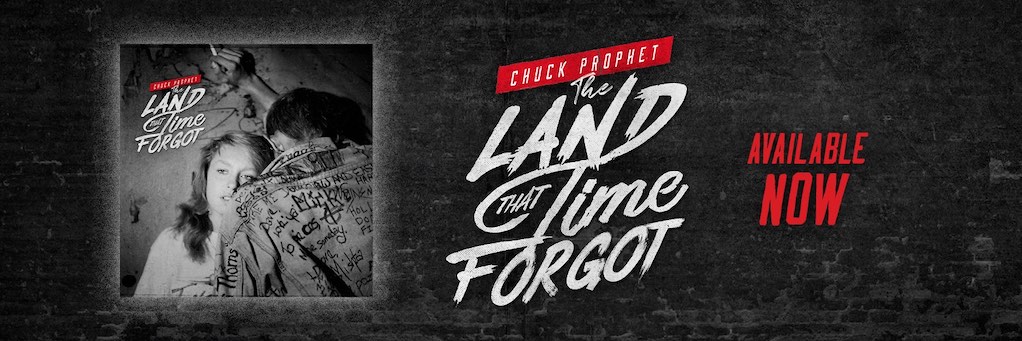

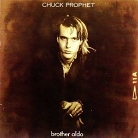
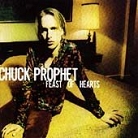



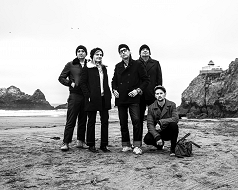
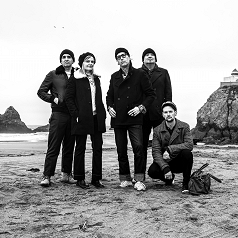
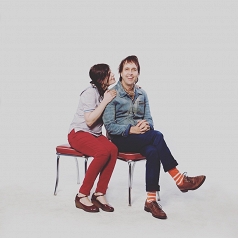
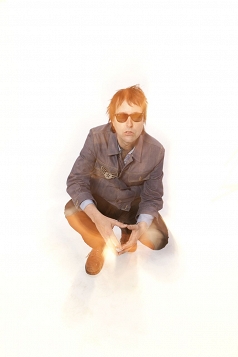

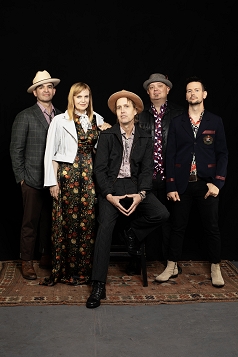
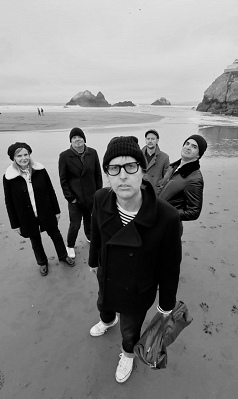
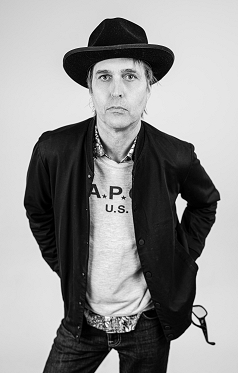
3_238_159auto_s_c1.jpeg)
